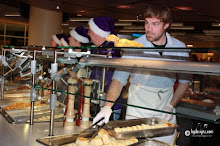So I did it. I read the entire Quran. What a rewarding and challenging experience it was.
The Quran, for me, can be summed up (the Quran is extremely complex, I am just reflecting on that which I perceived to be most meaningful) by the short phrase that prefaces every Surah: "In the name of Allah, Most Gracious, Most Merciful." The Quran, time and time again, urged the reader to remember that Allah is the Creator of all, who watches over us, is with us in tough time, and whose grace and mercy abound in our lives. My favorite Surah is 93, "The Glorious Morning Light." It illustrates Allah's grace and mercy poignantly. It's language reminds me of the poetic style of the Psalter. It reads:
- By the Glorious Morning Light,
- And by the Night when it is still,—
- Thy Guardian-Lord hath not forsaken thee, nor is He displeased.
- And verily the Hereafter will be better for thee than the present.
- And soon will thy Guardian-Lord give thee (that wherewith) thou shalt be well-pleased.
- Did He not find thee an orphan and give thee shelter (and care)?
- And He found thee wandering, and He gave thee guidance.
- And He found thee in need, and made thee independent.
- Therefore, treat not the orphan with harshness,
- Nor repulse the petitioner (unheard);
- But the bounty of the Lord — rehearse and proclaim!
Our life (and afterlife) is a gift from Allah. In response to this gift, to Allah's grace and mercy, and in response to the revelations of Allah's prophets we live a life of prayer, devotion to God, and to our neighbor. Surah 107 reminds the reader that one must take care of the marginalized and disenfranchised.
I learned so much during this project and believe that I connected more deeply with Islam and my Muslim neighbor. While the final part of my project will be visiting Dearborn, MI and the largest mosque in America, I'm proud to be able to say that I have read the Quran. And hopefully, I will be better able to minister to Christian, Muslims, and others having done so.
I've always thought that expanding your worldview and challenging your faith by learning about the world's great religions is the best way to grow spiritually. I now know what the Quran says. Much of it was beautifully written. It's stories and lessons promote a loving, peaceful, and faithful way of life. While I do disagree with some of it, I feel that it inspired my own Christian faith and pluralist worldview to deepen. It gave me another tool in my toolbox to promote interfaith cooperation. And I think I come away from this project seeing Islam as like a second language to me. Christianity is my first language of faith, but Islam is beginning to a be a second. While by no means am I fluent, at least I know a little. And while I can never know the various nuances and minutia of the Islamic faith, hopefully, this can serve as a point of reference and a bridge-builder to shared acts of faith in the future. I see Muslims with eyes of deep respect, reverance, and admiration for leading lives inspired and guided by Allah and the Quran.
Islam is a beautiful religion. One of the world's great gifts. I want to leave you with two videos. The first I took back in 2007 when I was in seminary. The video is set in the town of Acco, Israel. This was my first real encounter with Islam as it is lived out by Muslims all over the world. The calling to prayer sung by this man is quite spiritually inspiring. It left an impression on my heart.
The second video is from 2008 when I visited Cairo, Egypt. It was taken at the bazaar, right before I joined in a soccer pickup game with the locals.
Posted via email from Advent with Islam: A Presbyterian Chaplain's Journey with the Quran









